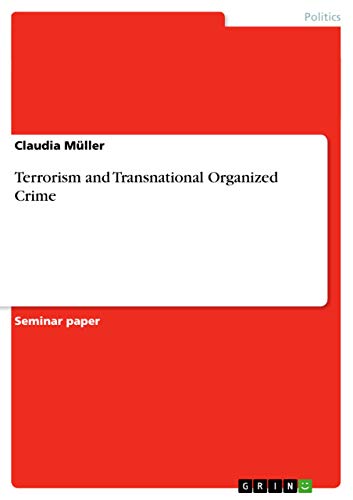Verwandte Artikel zu Terrorism and Transnational Organized Crime

Zu dieser ISBN ist aktuell kein Angebot verfügbar.
Alle Exemplare der Ausgabe mit dieser ISBN anzeigen:„Über diesen Titel“ kann sich auf eine andere Ausgabe dieses Titels beziehen.
- VerlagGRIN Publishing
- Erscheinungsdatum2013
- ISBN 10 3656421358
- ISBN 13 9783656421351
- EinbandTapa blanda
- Auflage1
- Anzahl der Seiten40
Neu kaufen
Mehr zu diesem Angebot erfahren
Versand:
EUR 32,99
Von Deutschland nach USA
Beste Suchergebnisse beim ZVAB
Terrorism and Transnational Organized Crime
Buchbeschreibung Taschenbuch. Zustand: Neu. Druck auf Anfrage Neuware - Printed after ordering - Seminar paper from the year 2012 in the subject Politics - International Politics - Topic: Peace and Conflict Studies, Security, grade: 1,0, Humboldt-University of Berlin, language: English, abstract: 'We will direct every resource at our command to win the war against terrorists, every means ofdiplomacy, every tool of intelligence, every instrument of law enforcement, every financial influence.We will starve the terrorists of funding, turn them against each other, rout them out of their safehiding places, and bring them to justice' (Cited in Biersteker and Eckert 2008: 1).President George W. Bush, September 24, 2001In the immediate aftermath of the attacks in the United States on 11 September 2001 President W.Bush declared America's 'War on Terrorism' in which he assured to defeat terrorist movementsand their methods of funding that could be used to support the acts of global terrorist (Bierstekerand Eckert 2008; 1). The examination of broader terrorism studies literature shows 'financial andmaterial resources are correctly perceived as the lifeblood of terrorist operations, and governmentshave determined that fighting the financial infrastructure of terrorist organizations is the key totheir defeat' (Grialdo and Trinkunas 2007; 1). Since the attacks of 9/11 the US has designed a strongstrategy to fight terrorist groups and their financing. International and national measures have beencarried out such as the International Convention for the Suppression of the Financing of Terrorism,the enforcement of international sanctions, and the expansion of law enforcement to targetterrorism financing and disrupt terrorist operation (Sheppard 2002). However, the spectrum ofterrorist funding is broad. In particular, the increasing reliance on criminal activities by terrorist sincethe end of the Cold War and the subsequent decline of state sponsorship, such as the rising pressureof law enforcement, network structures became an essential source to safeguard the existenceof many terrorist and criminal groups. The development of the so- called 'crime- terror' nexus, inwhich two traditionally autonomous groups started to expose various operational and structuralparallels, implicated a key income source for terrorists and has brought sheer difficulty to developsuccessful strategies to freeze the terrorist monetary trail. In the following, this essay examines theinvolvement of terrorist groups in criminal activities as a source of funding and whether or not it is asustainable and profitable source for terrorist funding. Moreover, we try to evaluate to what extentthe so- called 'terror-crime nexus' poses a threat to global security. Artikel-Nr. 9783656421351
Weitere Informationen zu diesem Verkäufer | Verkäufer kontaktieren

